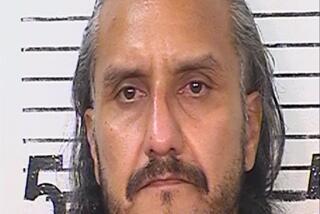Camarena Case Figure Denied Bail : Perjury Suspect Is Target of Probe in Slaying of U.S. Agent
- Share via
Bail was denied Monday for a Mexican police agent linked by U.S. officials to the slaying of U.S. drug agent Enrique Camarena.
U.S. Magistrate Barry Ted Moskowitz ruled that Mario Martinez Herrera, a sub-commander in the Mexican General Directorate for Investigations of National Security (DIGSN), would be a flight risk and ordered him held without bail. Martinez is charged with a single count of perjury.
Martinez was indicted by a federal grand jury in San Diego for allegedly lying when he testified he had never been in Guadalajara, Mexico. Camarena was allegedly kidnaped and tortured by Mexican drug traffickers in Guadalajara in February, 1985, and his body was found there a month later.
In addition to the perjury count, U.S. prosecutors told Moskowitz that Martinez is a material witness to Camarena’s kidnap-slaying and is a target of the investigation. Defense attorney Michael P. Murray argued that his client was not involved in the killing and charged that bail was denied because of the “aura” of the Camarena investigation.
Moskowitz said that the government’s allegations of Martinez’s involvement in Camarena’s death did not influence his decision against granting bail. James Wilson, a Justice Department attorney from Washington, argued that Drug Enforcement Administration informants had linked Martinez to Ernesto Fonseca Carrillo, a notorious Mexican drug kingpin jailed in Mexico and charged with being a participant in Camarena’s death. Wilson also said that U.S. investigators have recovered forensic evidence that allegedly links Martinez to the house where Camarena was tortured.
However, Wilson declined to reveal the physical evidence that allegedly links Martinez to the torture site or to reveal any more information about the informant’s statement to DEA agent David Gauthier. Gauthier testified that the informant told him that Martinez was a gunman for Fonseca and that he saw Martinez in Guadalajara.
When Murray attempted to ask Gauthier when the informant saw Martinez in Guadalajara, Wilson objected and Moskowitz stopped the questioning.
On Friday, the second day of the three-day hearing, Moskowitz read in his chambers a secret government affidavit that detailed Martinez’s purported involvement in the Camarena case. On Monday, Moskowitz said that information in the four-page document is “at best based on multiple levels of hearsay.” Moskowitz also warned that sooner or later prosecutors will have to show Murray the physical evidence that ties his client to the torture scene and opined that Martinez’s legal troubles may continue long after his perjury case is settled.
“His relation to the Camarena investigation is likely to continue for some time,” Moskowitz said.
Murray said that the four-page affidavit was signed by Gauthier and suggests that Martinez is the Mexican police agent believed by the DEA to have supervised Camarena’s torture. In February, The Times reported that U.S. investigators had acquired from Mexican officials eight tape recordings of the two-day torture session of Camarena.
A source familiar with the case said that Martinez agreed to give investigators a voice sample and was asked to repeat several dozen statements made by the Mexican police official who is believed to have supervised the torture and is heard on the tapes.
More to Read
Sign up for Essential California
The most important California stories and recommendations in your inbox every morning.
You may occasionally receive promotional content from the Los Angeles Times.









